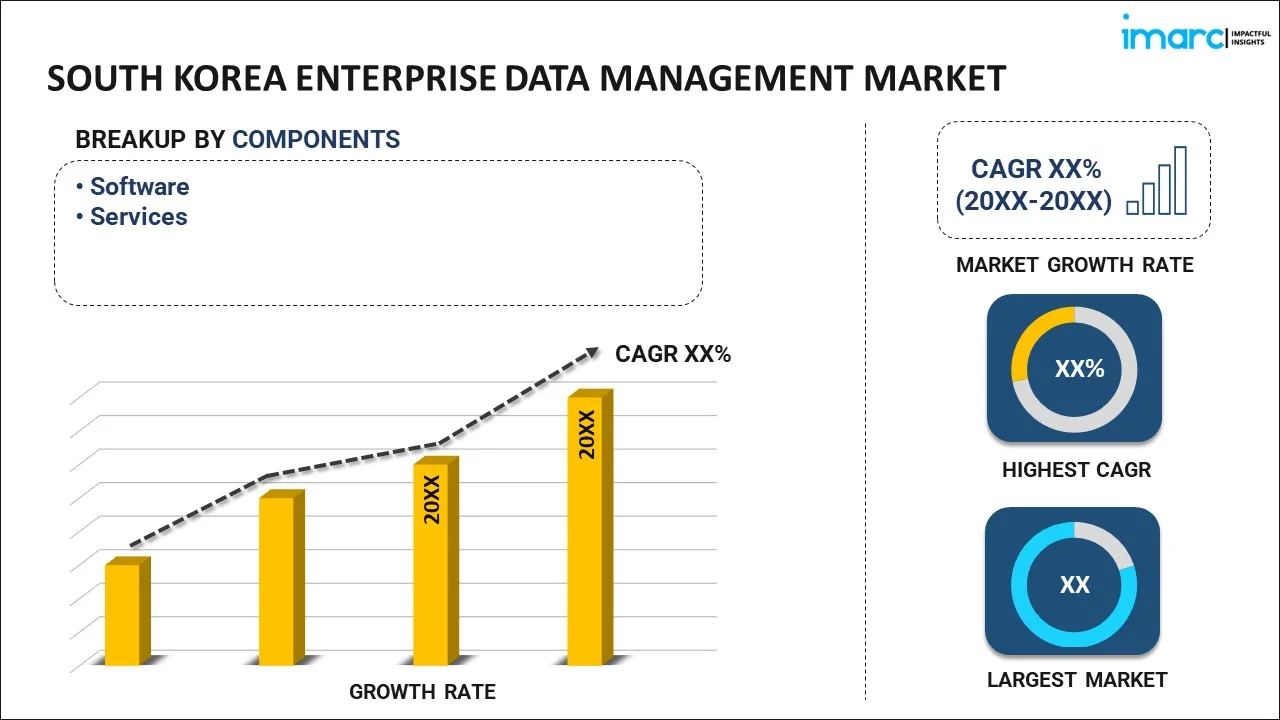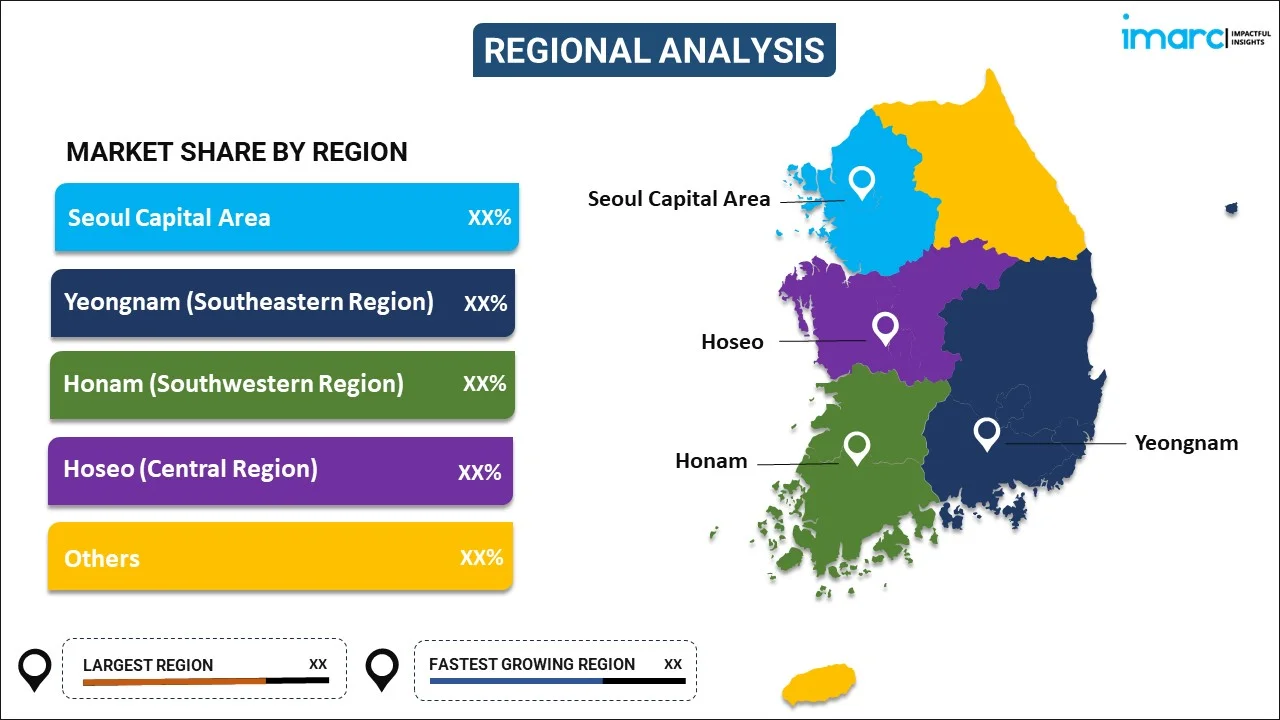
South Korea Enterprise Data Management Market Report by Component (Software, Services), Deployment (Cloud-based, On-premises), Enterprise Size (Small and Medium-sized Enterprises, Large Enterprises), Industries (IT and Telecom, Banking, Financial Services, and Insurance, Retail and Consumer Goods, Healthcare, Manufacturing, and Others), and Region 2025-2033
Market Overview:
South Korea enterprise data management market size is projected to exhibit a growth rate (CAGR) of 5.89% during 2025-2033. The growing adoption of cloud-based solutions as they enable seamless collaboration, data integration, and accessibility, rising proliferation of data sources and formats, and increasing emphasis on data governance and compliance represent some of the key factors driving the market.
|
Report Attribute
|
Key Statistics
|
|---|---|
|
Base Year
|
2024 |
|
Forecast Years
|
2025-2033
|
|
Historical Years
|
2019-2024
|
| Market Growth Rate (2025-2033) | 5.89% |
Enterprise data management (EDM) is a robust approach that organizations adopt to manage their vast and diverse data assets effectively and efficiently throughout their lifecycle. It comprises master data management (MDM), data warehousing, data quality management, and data security management, which aims to protect data assets from unauthorized access. It involves the integration, quality assurance, security, and governance of data across the enterprise, ensuring that data is accurate, consistent, and available for decision-making processes. It focuses on maintaining high-quality data through processes like data profiling, cleansing, and validation. It encompasses measures, such as encryption, access controls, and monitoring, to protect data from unauthorized access, breaches, and cyber threats. It establishes policies, procedures, and controls to ensure that data is managed consistently and responsibly across the organization. EDM ensures that organizations have access to accurate and timely data, enabling informed decision-making at all levels. It helps organizations adhere to legal and industry-specific compliance requirements. It also streamlines business processes, reduces redundancies, and enhances overall operational efficiency. Besides this, it enables companies to achieve a competitive edge by leveraging their data as a strategic asset for innovation and growth.
South Korea Enterprise Data Management Market Trends:
At present, the increasing adoption of cloud-based solutions as they enable seamless collaboration, data integration, and accessibility, fostering a more dynamic and responsive data environment, represents one of the crucial factors impelling the growth of the market in South Korea. Organizations are progressively migrating their data management processes to cloud platforms, leveraging the scalability, flexibility, and cost-effectiveness offered by cloud based EDM solutions. This shift is driven by the need for greater agility in managing large volumes of diverse data types. Besides this, the rising emphasis on data governance and compliance is contributing to the market growth. As data privacy regulations are becoming more stringent in the country, organizations are prioritizing robust data governance frameworks to ensure regulatory compliance and mitigate risks associated with data breaches. In addition, organizations are leveraging artificial intelligence (AI) and machine learning (ML) algorithms to automate data management processes, enhance data quality, and uncover hidden patterns and insights. These technologies enable advanced data analytics and empower organizations to make data-driven decisions, thereby driving the demand for EDM solutions that seamlessly integrate with AI and ML capabilities. Apart from this, companies are realizing that the value of their data is directly tied to its quality, accuracy, and completeness. As a result, there is a growing demand for EDM solutions that include robust data quality management features, such as data profiling, cleansing, and enrichment. Additionally, the rising proliferation of data sources and formats is supporting the market growth in the country. There is a rise in the demand for EDM solutions that offer comprehensive data integration capabilities, including support for structured and unstructured data, for facilitating organizations in derive valuable insights from several data sources available.
South Korea Enterprise Data Management Market Segmentation:
IMARC Group provides an analysis of the key trends in each segment of the market, along with forecasts at the country level for 2025-2033. Our report has categorized the market based on component, deployment, enterprise size, and industries.
Component Insights:

- Software
- Data Security
- Master Data Management
- Data Integration
- Data Migration
- Data Warehousing
- Data Governance
- Data Quality
- Others
- Services
- Managed Services
- Professional Services
The report has provided a detailed breakup and analysis of the market based on the component. This includes software (data security, master data management, data integration, data migration, data warehousing, data governance, data quality, and others) and services (managed services and professional services).
Deployment Insights:
- Cloud-based
- On-premises
A detailed breakup and analysis of the market based on the deployment have also been provided in the report. This includes cloud-based and on-premises.
Enterprise Size Insights:
- Small and Medium-sized Enterprises
- Large Enterprises
The report has provided a detailed breakup and analysis of the market based on the enterprise size. This includes small and medium-sized enterprises and large enterprises.
Industries Insights:
- IT and Telecom
- Banking, Financial Services, and Insurance
- Retail and Consumer Goods
- Healthcare
- Manufacturing
- Others
A detailed breakup and analysis of the market based on the industries have also been provided in the report. This includes IT and telecom, banking, financial services, and insurance, retail and consumer goods, healthcare, manufacturing, and others.
Regional Insights:

- Seoul Capital Area
- Yeongam (Southeastern Region)
- Honam (Southwestern Region)
- Hoseo (Central Region)
- Others
The report has also provided a comprehensive analysis of all the major regional markets, which include Seoul Capital Area, Yeongam (Southeastern Region), Honam (Southwestern Region), Hoseo (Central Region), and Others.
Competitive Landscape:
The market research report has also provided a comprehensive analysis of the competitive landscape in the market. Competitive analysis such as market structure, key player positioning, top winning strategies, competitive dashboard, and company evaluation quadrant has been covered in the report. Also, detailed profiles of all major companies have been provided.
South Korea Enterprise Data Management Market Report Coverage:
| Report Features | Details |
|---|---|
| Base Year of the Analysis | 2024 |
| Historical Period | 2019-2024 |
| Forecast Period | 2025-2033 |
| Units | Million USD |
| Scope of the Report | Exploration of Historical and Forecast Trends, Industry Catalysts and Challenges, Segment-Wise Historical and Predictive Market Assessment:
|
| Components Covered |
|
| Deployments Covered | Cloud-based, On-premises |
| Enterprise Sizes Covered | Small and Medium-sized Enterprises, Large Enterprises |
| Industries Covered | IT and Telecom, Banking, Financial Services, and Insurance, Retail and Consumer Goods, Healthcare, Manufacturing, Others |
| Regions Covered | Seoul Capital Area, Yeongnam (Southeastern Region), Honam (Southwestern Region), Hoseo (Central Region), Others |
| Customization Scope | 10% Free Customization |
| Post-Sale Analyst Support | 10-12 Weeks |
| Delivery Format | PDF and Excel through Email (We can also provide the editable version of the report in PPT/Word format on special request) |
Key Questions Answered in This Report:
- How has the South Korea enterprise data management market performed so far and how will it perform in the coming years?
- What has been the impact of COVID-19 on the South Korea enterprise data management market?
- What is the breakup of the South Korea enterprise data management market on the basis of component?
- What is the breakup of the South Korea enterprise data management market on the basis of deployment?
- What is the breakup of the South Korea enterprise data management market on the basis of enterprise size?
- What is the breakup of the South Korea enterprise data management market on the basis of industries?
- What are the various stages in the value chain of the South Korea enterprise data management market?
- What are the key driving factors and challenges in the South Korea enterprise data management?
- What is the structure of the South Korea enterprise data management market and who are the key players?
- What is the degree of competition in the South Korea enterprise data management market?
Key Benefits for Stakeholders:
- IMARC’s industry report offers a comprehensive quantitative analysis of various market segments, historical and current market trends, market forecasts, and dynamics of the South Korea enterprise data management market from 2019-2033.
- The research report provides the latest information on the market drivers, challenges, and opportunities in the South Korea enterprise data management market.
- Porter's five forces analysis assist stakeholders in assessing the impact of new entrants, competitive rivalry, supplier power, buyer power, and the threat of substitution. It helps stakeholders to analyze the level of competition within the South Korea enterprise data management industry and its attractiveness.
- A competitive landscape allows stakeholders to understand their competitive environment and provides an insight into the current positions of key players in the market.
Need more help?
- Speak to our experienced analysts for insights on the current market scenarios.
- Include additional segments and countries to customize the report as per your requirement.
- Gain an unparalleled competitive advantage in your domain by understanding how to utilize the report and positively impacting your operations and revenue.
- For further assistance, please connect with our analysts.
 Request Customization
Request Customization
 Speak to an Analyst
Speak to an Analyst
 Request Brochure
Request Brochure
 Inquire Before Buying
Inquire Before Buying




.webp)




.webp)












